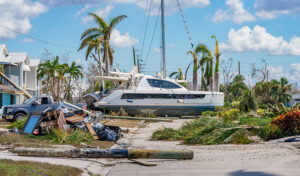Every homeowners association should make sure it has sufficient insurance coverage. But, with rising HOA insurance rates, many are finding it difficult to keep up without causing significant financial strain to their bank accounts.
Understanding the Phenomenon of Rising HOA Insurance Rates
The HOA insurance market has been experiencing a notable shift within the last couple of years. Insurance premiums were not all too expensive a decade ago, but associations are now struggling to maintain coverage. This is evident in a recent survey by the Foundation for Community Association Research (FCAR).
According to the survey, 91% of HOA-affiliated respondents saw an unexpected increase in expenses because of rising costs and inflation. Insurance is one of the top areas where respondents saw an increase, second only to management costs.
A cocktail of economic and natural elements has led to rising HOA insurance rates. Natural disasters have become more common and recurring, and those disasters often leave behind a trail of expensive damage. The COVID-19 pandemic also played a role in the destabilization of the investment market, which has caused many carriers to shut down. Inflation, the rising cost of materials, and more expensive labor are also contributing factors.
Experts in the industry do see increasing HOA insurance rates as a long-term problem as risks continue to multiply. And some areas are affected in a disproportionate manner. Certain types of insurance policies are becoming more expensive in certain areas. For instance, California associations are having a hard time securing adequate fire insurance at an affordable rate, as wildfires remain a significant problem in several parts of the state.
And it is not just HOAs that have this problem. The homeowners themselves are having trouble keeping up with rising homeowners insurance premiums. Many insurance companies are even cutting the cord on several policies, causing homeowners to go without fire coverage.
The Importance of HOA Insurance
 Insurance has long been among the top priorities of homeowners associations. It is integral to limit an HOA’s exposure to potential liability. But, due to rising HOA insurance premiums, many HOA boards are thinking twice about whether or not to continue renewing their policies.
Insurance has long been among the top priorities of homeowners associations. It is integral to limit an HOA’s exposure to potential liability. But, due to rising HOA insurance premiums, many HOA boards are thinking twice about whether or not to continue renewing their policies.
It is understandable for some boards to want to save money by skipping proper insurance coverage. After all, they don’t want to deal with the backlash that may come from the decision to raise regular dues just to afford the policies. But, considering that rising rates are largely affected by the recurrence of natural disasters, it is even more important to secure sufficient coverage now.
Should a natural disaster hit your community, you would want to be financially prepared for the aftermath. Without insurance, the bulk — if not all — of the weight would fall on the association’s shoulders.
Condominiums have another element to consider. More often than not, financing agencies such as Fannie Mae require condominiums to have adequate coverage before approving a mortgage to would-be unit owners. As such, condos typically don’t even have a choice.
How to Cope With HOA Insurance Increases
Given the importance of insurance, homeowners associations simply can’t eliminate it completely from their budget. According to the FCAR survey, most HOAs are addressing the increase by raising assessments, reducing expenses, and reducing reserve contributions. To reduce expenses, associations primarily plan to delay maintenance and cut down on landscaping.
These are logical ways to deal with rising HOA insurance costs. But, in addition to these, there are other tips associations should keep in mind.
Choose a Good Broker
First, associations should get a good insurance broker. Brokers tend to have specific industries that they specialize in, so make sure you choose one that caters mostly to HOAs. With a good broker by your side, you can rest easy knowing you are getting sound advice. This will help your HOA board make better business decisions for your association.
Go for “Bare Walls” Coverage
Most associations require comprehensive insurance coverage. But, considering the circumstances, your association might want to downgrade to a “Bare Walls” policy, which could lower the premium by around 5%. Bare Walls insurance only covers the shell of the building and provides the bare minimum protection.
Changing to a “Bare Walls” policy will usually require you to amend your governing documents, which will typically require a vote of approval from the membership. Moreover, it is best to seek counsel from an attorney prior to downgrading your policy.
Increase Deductibles
Another way to reduce insurance costs is to increase deductibles. This means your HOA will have to shoulder higher costs out of pocket if something happens, but at least your association will not have to absorb the entire financial blow by itself.
Review Policies Annually
All HOAs should make it a habit to review their insurance policies on a yearly basis. This will allow boards to examine what areas require more coverage and whether or not current coverage meets the requirements of the governing documents. Then, boards can make adjustments as necessary. Insurance rates can also go up and down each year, so reviewing your policies lets you secure the best deal possible.
Furthermore, it is important to establish and maintain a healthy business relationship with your insurance provider. In doing so, your provider will make more of an effort to look out for your association and ensure that all your needs are met.
Make Sure Vendors Have Coverage
 Associations face many types of risks — natural disasters, accidents, and lawsuits. Try as you might, these risks always exist, and it is impossible to completely get rid of them. However, there is one type of risk that you can eliminate: vendor-related risks.
Associations face many types of risks — natural disasters, accidents, and lawsuits. Try as you might, these risks always exist, and it is impossible to completely get rid of them. However, there is one type of risk that you can eliminate: vendor-related risks.
By requiring all of your HOA’s vendors to carry proper insurance, you can save your association from liability. Vendors should have adequate general liability, worker’s comp, and commercial auto insurance. This way, if a vendor’s employee gets injured or causes an injury, the HOA will not have to shoulder the responsibility.
To enforce this requirement, your HOA board should vet vendors thoroughly. Make sure to review all vendor contracts on an annual basis. Ask for their insurance certificates to prove their coverage.
Grit Your Teeth
Rising HOA insurance rates have become a huge problem in the HOA industry. Given that there is nothing associations can do to sway providers into lowering their premiums, HOAs should strap up and bear with it for now. Insurance is essential, so it is best to simply make adjustments to afford it instead of removing it entirely from the budget. Insurance rates will likely stabilize again over time, though it remains to be seen how long it will take to get there.
Clark Simson Miller offers HOA management services, including assistance with insurance, to homeowners associations. Call us today at 865.315.7505 or contact us online to request a free proposal!
RELATED ARTICLES:
- 5 Uncommon HOA Insurance Updates To Protect Your Community From The Unexpected
- D&O Insurance: A Rundown For The HOA Board
- How To Conduct An HOA Insurance Review And Why Do It?

